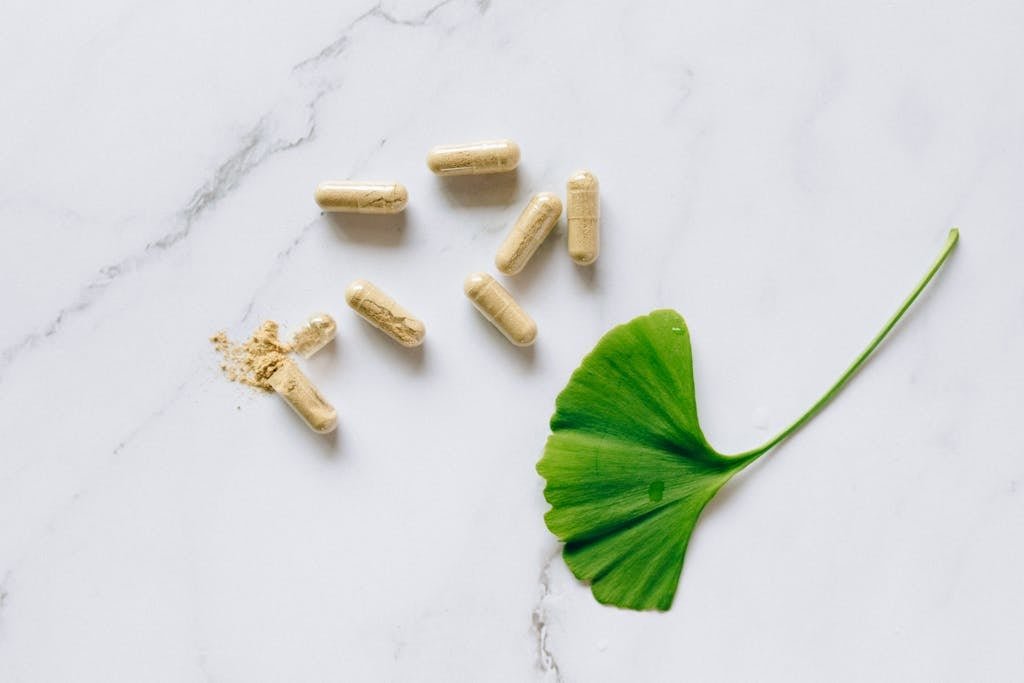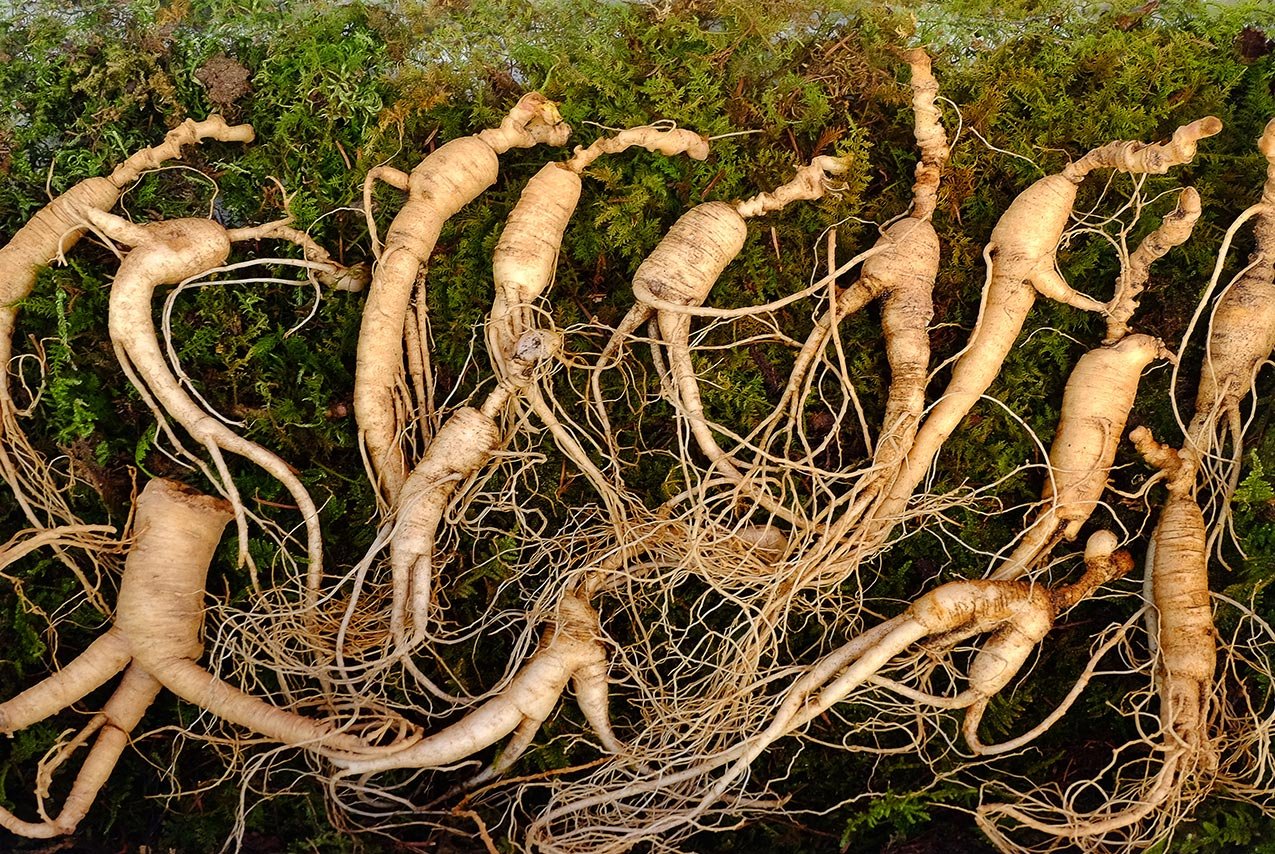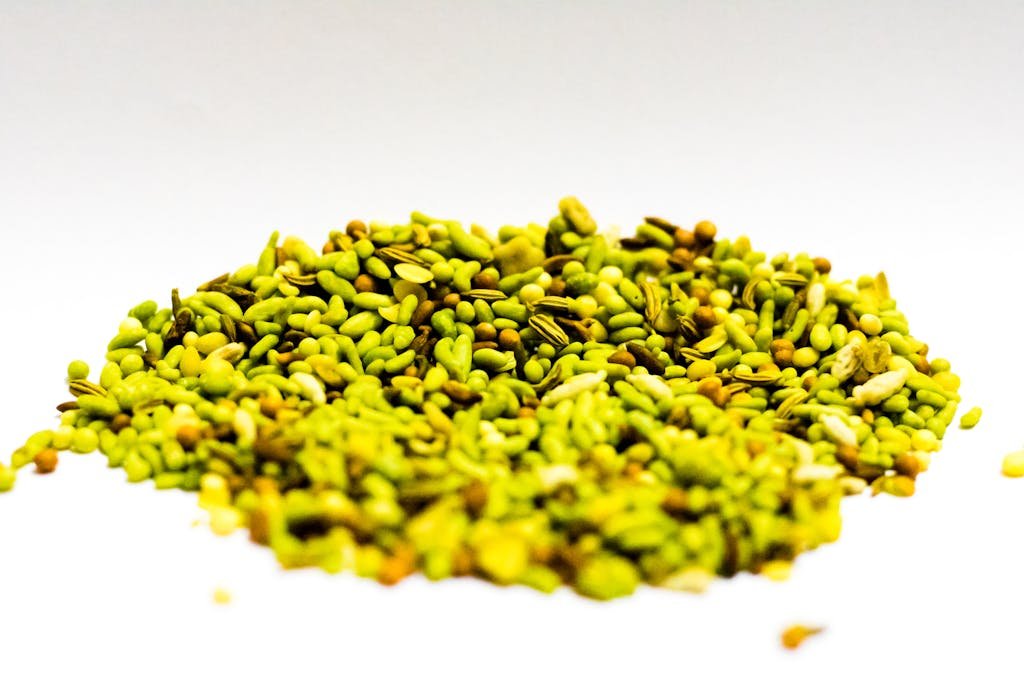Ginkgo – (Ginkgoaceae ginkgo)
Ginkgo biloba, often simply referred to as ginkgo, is a marvel of the plant kingdom. This ancient tree, belonging to the Ginkgoaceae family, has been captivating humans for centuries with its unique fan-shaped leaves and profound history. It’s not just a living fossil but a testament to survival, having thrived on Earth for over 200 million years.
Today, ginkgo is celebrated not only for its ornamental beauty but also for its health benefits. Its leaves are packed with potent compounds that have been linked to improved brain function, making it a popular supplement worldwide. As we delve deeper into the world of ginkgo, we uncover a story of resilience, beauty, and utility that continues to unfold.
Key Takeaways
- Ginkgo biloba, a living fossil from the Ginkgoaceae family, is renowned for both its ornamental beauty and its health benefits, offering potent compounds like flavonoids and terpenoids that support brain function and improve blood circulation.
- The resilience of the Ginkgo biloba tree is remarkable, having survived for over 270 million years through drastic
The Marvel of Ginkgo Biloba
Ginkgo biloba, often simply called ginkgo, stands as a testament to resilience and natural wonder. It’s considered a living fossil, with a lineage tracing back over 270 million years. This unique tree, originating from China, has captivated scientists, horticulturists, and wellness enthusiasts worldwide due to its hardiness and the myriad of benefits it offers.
One of the most remarkable aspects of ginkgo is its ability to withstand environmental stressors. Surviving the ice ages and even the atomic bomb in Hiroshima, ginkgo trees are a symbol of endurance and survival. Their resilience is not just a historical footnote; it’s a feature that makes them excellent urban trees, able to thrive amidst pollution and confined soil spaces.
Beyond its impressive survival story, ginkgo biloba is renowned for its health benefits. Research has extensively examined ginkgo’s effects on the brain. A pivotal study published in the Journal of the American Medical Association studied the impact of ginkgo extract on cognitive function among older adults, highlighting its potential to support memory and cognitive speed.
| Health Benefit | Evidence (Study or Review) |
|---|---|
| Memory Improvement | Journal of the American Medical Association study on cognitive function |
| Antioxidant Properties | Various studies on ginkgo’s flavonoids and terpenoids |
Ginkgo leaves, rich in flavonoids and terpenoids, are known for their potent antioxidant properties. These compounds combat oxidative stress, a key factor in chronic diseases and aging. Thus, ginkgo supplements have become popular for those seeking to maintain brain health and overall vitality.
Moreover, ginkgo’s ability to improve blood circulation is another cornerstone of its health claims. By promoting better blood flow, particularly to the brain, ginkgo supplements are believed to enhance cognitive functions and possibly counteract conditions like dementia and Alzheimer’s.
While the full extent of ginkgo biloba’s benefits continues to be a subject of ongoing research, its story intertwines the resilience of nature with the quest for understanding how ancient remedies can be applied to modern health challenges.
Understanding the Ginkgoaceae Family
The Ginkgoaceae family, a unique and ancient group of trees, stands alone in the botanical world. Ginkgo biloba is the sole survivor of this lineage, often termed a “living fossil” due to its unchanged existence over millions of years. This extraordinary tree encapsulates the resilience and continuity of nature like no other.
Research into the Ginkgoaceae family reveals its roots stretching back over 270 million years, making it one of the oldest living tree species on the planet. This lineage predates even the dinosaurs, surviving through epochs of drastic climate changes and geological shifts. The remarkable endurance of the ginkgo tree underscores not only its botanical interest but also its significant evolutionary story.
The physical characteristics of ginkgo are as distinctive as its history. Ginkgo trees can grow to a majestic height of up to 120 feet, with fan-shaped leaves that turn a brilliant yellow in the fall. These leaves, which are rich in flavonoids and terpenoids, contribute to the tree’s renowned health benefits. They are the essence of its resilience, with natural components that have protected the species from environmental stressors over millennia.
Studies focusing on the Ginkgoaceae family emphasize the tree’s ability to adapt and thrive in varied conditions. Its capacity to withstand pollution and resist disease makes it a favored choice for urban landscaping around the globe. Moreover, the ginkgo tree’s longevity, with some specimens living over 1,000 years, is a testament to its remarkable adaptability and vitality.
The ginkgo tree’s contributions to modern medicine are equally impressive. Ginkgo biloba extracts are widely studied for their potential therapeutic effects, particularly in enhancing memory and cognitive function. Researchers attribute these benefits to the tree’s unique blend of phytochemicals, which improve blood circulation and exhibit potent antioxidant properties.
By exploring the Ginkgoaceae family, one gains insight into the incredible journey of a species that has stood the test of time. Its unparalleled history, captivating botanical features, and promising health applications continue to fascinate scientists and enthusiasts alike.
The Unique Fan-shaped Leaves of Ginkgo
The Ginkgo biloba tree, often celebrated for its resilience and ancient lineage, is equally renowned for its distinctive fan-shaped leaves. These leaves not only serve as a symbol of longevity and peace but also play a pivotal role in the tree’s survival and therapeutic applications.
Ginkgo leaves are bi-lobed, resembling a fan, and have a unique radiating vein pattern that differs significantly from the branching veins seen in most other trees. This pattern ensures efficient photosynthesis, enabling the ginkgo to thrive in a wide range of environmental conditions. The leaves transition from a vibrant green to a rich golden yellow in the fall, creating breathtaking landscapes in urban and natural settings alike.
Phytochemical Richness
The real magic of ginkgo leaves lies in their rich composition of phytochemicals, particularly flavonoids and terpenoids. Flavonoids, known for their antioxidant properties, help combat oxidative stress, while terpenoids improve blood circulation by dilating blood vessels and reducing platelet aggregation. This potent combination has been the focus of numerous studies exploring ginkgo’s potential health benefits.
One notable study published in the Journal of Natural Medicines highlights the neuroprotective effects of ginkgo leaf extracts, attributing these benefits to their antioxidant properties and ability to improve blood flow. These findings support the traditional use of ginkgo leaves in enhancing cognitive function and memory.
Adaptation and Utility
The adaptability of ginkgo leaves to various environmental stressors also contributes to the tree’s remarkable longevity. They exhibit a strong resistance to pollutants, making ginkgo a preferred species for urban landscaping. This resilience, combined with their aesthetic appeal, ensures that ginkgo trees continue to be a valued addition to city streets and parks.
The utility of ginkgo leaves extends beyond their visual and environmental contributions. In modern medicine, extracts from these leaves are used in supplements aimed at enhancing mental acuity and treating circulatory disorders. Their widespread use underscores the continuing interest in and recognition of ginkgo’s unique attributes.
As research on Ginkgo biloba progresses, the intrigue surrounding its fan-shaped leaves and the secrets they hold continues to captivate scientists and enthusiasts alike.
Unraveling the Profound History of Ginkgo
Ginkgo biloba, often referred to as the living fossil, has a history as intricate and fascinating as its biological makeup. This ancient tree, belonging to the Ginkgoaceae family, has survived for over 200 million years, predating even the dinosaurs. Its resilience through major extinction events and environmental changes provides a unique window into the past and underlines the tree’s exceptional adaptability.
The first scientific recognition of ginkgo dates back to the late 17th century when Engelbert Kaempfer, a German naturalist, documented it during his travels in Japan. However, fossil records reveal that the Ginkgo species was once widespread across many continents, from North America to Europe and Asia. Today, it remains in the wild only in a small region of China, but its cultivation across the globe speaks volumes about its enduring appeal and vitality.
Research into the Ginkgoaceae family suggests pivotal evolutionary adaptations that have contributed to the ginkgo’s longevity. A notable feature is its distinct fan-shaped leaves, which maximize photosynthesis efficiency and aid in surviving various environmental stresses. Additionally, ginkgo trees are known for their resistance to pollution and pests, making them popular in urban landscaping.
Recent studies have focused on the therapeutic potential of ginkgo leaf extracts. Scientists are examining the phytochemicals within ginkgo leaves, such as flavonoids and terpenoids, for their antioxidant properties and potential benefits in enhancing cognitive function and circulation.
The ongoing fascination with Ginkgo biloba reflects not only its historical significance but also its value in contemporary scientific research. The tree’s ability to adapt and thrive mirrors the continued interest and investments in understanding its secrets, ensuring that ginkgo remains a subject of admiration and study.
Ginkgo: A Living Fossil and a Testament to Survival
The Ginkgo biloba, often hailed as a living fossil, stands as a resilient testament to survival, with a lineage stretching back over 270 million years. This unique tree, belonging to the Ginkgoaceae family, has remarkably withstood drastic climatic changes and major extinction events that wiped out entire species. Today, it not only thrives in a variety of climatic conditions but also offers profound therapeutic benefits.
Researchers have revealed that the Ginkgo biloba’s ability to survive through epochs lies in its extraordinary genetic makeup and adaptability. Studies have found that the tree’s genetic diversity allows it to adapt to various environmental stressors, contributing to its longevity and survival. This adaptability is also reflected in its leaves, which have evolved to efficiently capture sunlight for photosynthesis while withstanding environmental stress.
The therapeutic potential of Ginkgo biloba is profound. Its leaves contain a rich blend of phytochemicals, including flavonoids and terpenoids, known for their antioxidant properties. These compounds greatly contribute to the neuroprotective effects of ginkgo, enhancing cognitive function and memory in users. Research has documented ginkgo’s efficacy in improving blood circulation, which is pivotal in treating circulatory disorders and enhancing mental acuity.
Furthermore, the Ginkgo biloba tree’s landscape presence is not just aesthetic. It serves as a symbol of endurance and adaptability, making it a preferred choice for urban landscaping. The tree’s unique fan-shaped leaves, which turn a brilliant yellow in fall, have made it a favorite in gardens and parks around the world.
In addition to its biological and therapeutic significance, Ginkgo biloba holds a special place in cultural and historical contexts. It’s revered in many traditions for its longevity and resilience, embodying the essence of growth and survival against all odds.
Celebrating the Ornamental Beauty of Ginkgo
The Ginkgo biloba tree, often hailed for its multitude of health benefits, also boasts an incredible ornamental value that enhances urban and residential landscapes worldwide. Characterized by its unique fan-shaped leaves, which turn a brilliant yellow in the fall, Ginkgo serves as a breathtaking addition to any setting. Its remarkable adaptability to a variety of soil types and resistance to pests and diseases makes it an ideal choice for city parks and streets.
Landscapers and gardeners frequently commend Ginkgo for its aesthetic appeal and environmental resilience. The tree’s distinct foliage not only captures the attention of onlookers in the autumn months but also provides a dense canopy in the summer, offering much-needed shade and reducing urban heat islands. Researchers highlight the Ginkgo’s role in improving air quality, with its leaves effectively absorbing pollutants and increasing oxygen levels.
In addition to its environmental benefits, the Ginkgo biloba tree holds significant cultural and symbolic importance. Often planted in areas of historical significance or spiritual value, it symbolizes longevity and endurance. This is partly due to its lineage, which traces back over 270 million years, and its ability to withstand extreme conditions that have led to the extinction of numerous species.
The ornamental beauty of Ginkgo is not just a treat for the eyes but also serves a greater purpose in landscape architecture and urban planning. By incorporating Ginkgo trees into green spaces, cities can enhance their aesthetic appeal while contributing to the health and well-being of their residents. This perfect blend of form, function, and symbolism makes the Ginkgo biloba tree a celebrated component of landscapes around the globe.
Exploring the Health Benefits of Ginkgo Leaves
Ginkgo biloba, an ancient tree species, has adorned the planet for millions of years, but it’s the health benefits of its leaves that have caught the attention of modern science. The leaves of the Ginkgo biloba tree are rich in compounds that contribute not only to the tree’s resilience but also to human health. Two of the most significant phytochemicals found in Ginkgo leaves are flavonoids and terpenoids, substances known for their antioxidant and anti-inflammatory properties.
Researchers have extensively studied Ginkgo biloba for its potential benefits in improving cognitive function and memory. A pivotal study published in the Journal of the American Medical Association highlighted Ginkgo’s impact on enhancing cognitive performance in individuals with mild to moderate memory loss. This has led to Ginkgo biloba being widely regarded as a natural booster for brain health.
Equally important is Ginkgo’s role in enhancing blood circulation. Its ability to improve blood flow, especially to the peripheral parts of the body and the brain, makes it a natural ally in treating circulatory issues. This improved circulation may alleviate symptoms of claudication (pain caused by too little blood flow during exercise) and support overall cardiovascular health.
Another area where Ginkgo leaves show promise is in eye health. The antioxidants present protect against oxidative damage, a key factor in age-related macular degeneration and glaucoma. Studies suggest that regular intake of Ginkgo biloba extract could potentially slow the progression of age-related visual impairments.
While the evidence supporting Ginkgo biloba’s health benefits continues to grow, it’s important for individuals to consult healthcare providers before incorporating it into their health regimen. The interaction of Ginkgo with certain medications and its possible side effects warrant professional guidance to ensure safe usage.
In urban landscapes and health discussions alike, Ginkgo biloba stands out for its combination of historical significance, ornamental beauty, and therapeutic potential. As research unfolds, the list of benefits linked to Ginkgo leaves may well expand, underscoring the tree’s enduring legacy and versatility.
The Link Between Ginkgo and Improved Brain Function
Ginkgo Biloba, a tree native to China, has been a focus of scientific research due to its potential benefits for brain health. Studies have found that Ginkgo Biloba supplements, derived from the leaves of the tree, contain high levels of flavonoids and terpenoids. These compounds are known for their potent antioxidant and anti-inflammatory properties, offering a promising avenue for enhancing cognitive function.
Research suggests that Ginkgo Biloba can help improve blood flow to the brain. Improved blood circulation is crucial for maintaining cognitive agility, as it ensures a steady supply of oxygen and nutrients. This property makes Ginkgo an important herb for older adults looking to maintain their cognitive health.
One of the key studies on Ginkgo Biloba’s effect on brain function was published in the Journal of the American Medical Association. The study monitored participants over a period, noting significant improvements in memory and cognitive performance among those who regularly consumed Ginkgo Biloba supplements. Although results can vary and more research is needed, these findings provide a promising glimpse into Ginkgo’s potential as a cognitive enhancer.
Moreover, Ginkgo Biloba is believed to have neuroprotective effects. It may help protect nerve cells from damage associated with cognitive disorders. This is particularly relevant for conditions like Alzheimer’s disease and dementia, where cognitive decline is a major concern. By potentially slowing the progression of these conditions, Ginkgo Biloba could prove to be a valuable tool in the field of neurology.
Despite the promising benefits, it’s essential for individuals to consult with healthcare providers before starting any new supplement regimen, especially those with existing medical conditions or those taking other medications. Integrating Ginkgo Biloba into one’s daily health routine should be done cautiously to avoid any adverse effects.
As the research into Ginkgo Biloba and its impact on brain health continues, it remains a topic of interest for both the scientific community and those exploring natural ways to support their cognitive function.
Ginkgo: A Popular Supplement Worldwide
Ginkgo biloba, often simply referred to as ginkgo, has carved its niche as a globally sought-after supplement. Hailing from the Ginkgoaceae family, this ancient tree is revered not only for its longevity but also for its multifaceted health benefits. The surge in its popularity across continents is not merely a trend but a testament to its effectiveness, supported by numerous studies and traditional practices that go back centuries.
At the heart of ginkgo’s appeal are its flavonoids and terpenoids—compounds known for their potent antioxidant and anti-inflammatory properties. These bioactive components make ginkgo extracts highly effective in combating oxidative stress and improving circulation, contributing to their widespread use in enhancing cognitive function and vascular health.
The global acceptance of Ginkgo biloba as a therapeutic agent is backed by substantial research. A significant study, for instance, illuminated ginkgo’s capacity to augment memory and cognitive performance among adults, marking a pivotal point in its scientific endorsement.
| Study Outcome | Details |
|---|---|
| Memory Enhancement | Ginkgo supplementation led to noticeable improvements in memory recall and cognitive speed. |
| Cognitive Function | Participants showed enhanced cognitive performance, particularly in tasks requiring focus and memory. |
Market trends reflect ginkgo’s prominence in the supplement industry, with a notable surge in demand in both Eastern and Western markets. In Asia, its traditional use in herbal medicine blends seamlessly with modern supplements, while in the West, ginkgo products are highly sought after for cognitive and vascular health support.
As the body of research grows, so does interest in ginkgo’s potential applications beyond cognitive enhancement. Studies are exploring its efficacy in areas such as cardiovascular health, anxiety reduction, and even in managing symptoms related to Alzheimer’s disease and dementia. This ongoing research ensures that ginkgo remains at the forefront of natural supplement options, underscoring its role in promoting holistic health and wellness globally.
Ginkgo biloba stands out as a testament to nature’s power to support human health and wellness. Its unique blend of flavonoids and terpenoids not only showcases its resilience but also its beauty and utility in the realm of natural supplements. With a rich history and promising future, Ginkgo biloba continues to captivate researchers and consumers alike.
Its role in enhancing cognitive function and vascular health is just the beginning. As research unfolds, the potential of Ginkgo biloba to contribute to various aspects of health and wellness solidifies its position as a staple in the supplement industry. It’s a beacon of hope for those seeking natural ways to support their health journey.




